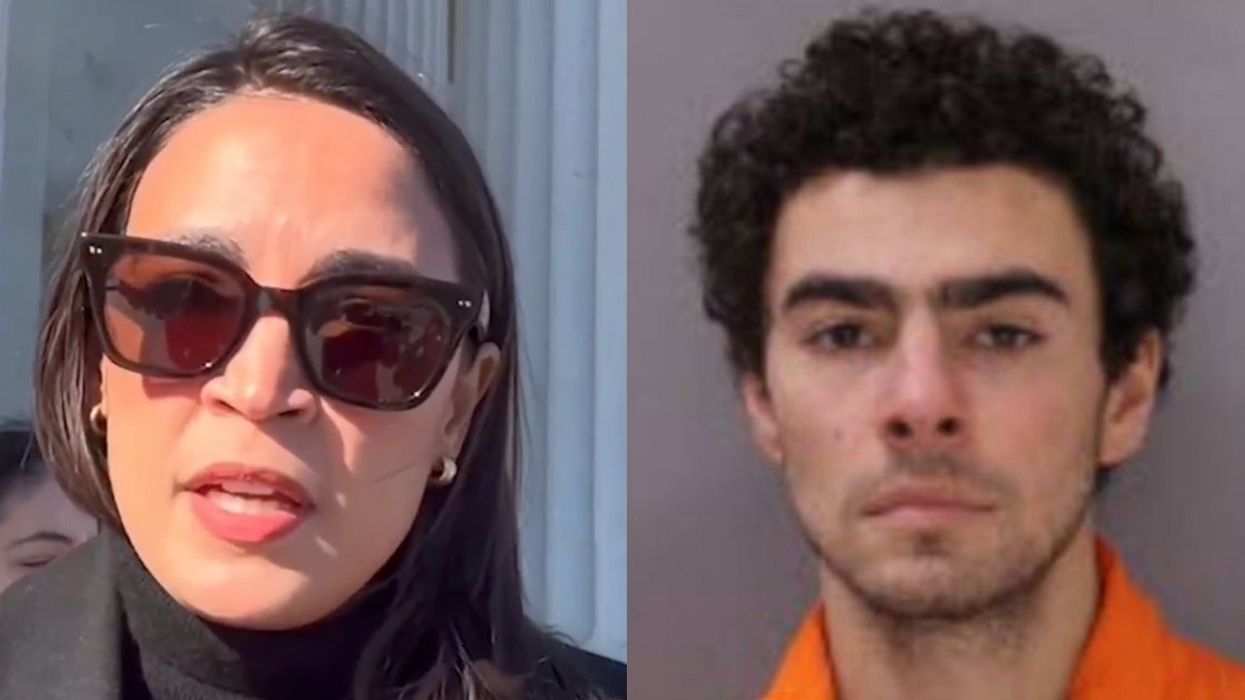New York Democratic Representative Alexandria Ocasio-Cortez had a blunt assessment about the healthcare industry in remarks about the fatal shooting of United Healthcare CEO Brian Thompson, noting that the nation's privatized healthcare system is an act of "passive violence" against the American people.
Luigi Mangione, 26, was charged last Monday in Manhattan with second-degree murder, forgery, and three firearm-related offenses. The charges stem from the fatal shooting of Thompson in Midtown Manhattan last week. The New York Police Department had previously released images of Mangione in connection with the incident.
Reports suggest that Mangione underwent back surgery and may suffer from chronic back pain. Authorities revealed the suspect had written a manifesto criticizing the health insurance industry. Public reactions to Thompson’s killing have varied widely, ranging from condemnation to indifference, and even celebratory responses in some corners.
Mangione's actions appeared to be fueled by anger toward the health insurance industry and broader frustrations with “corporate greed.”
Critics of UnitedHealthcare have pointed out its controversial practices, including the use of algorithms to deny care, and noted that it has the highest claim denial rate among health insurers—factors that have drawn little sympathy from some observers.
And Ocasio-Cortez pointed out that these denied claims could be interpreted as "an act of violence" by people struggling to afford health-related costs.
She said:
"For anyone who I think is shocked or surprised at the scale at which this incident has gripped the public consciousness and imagination, I think people need to understand how much everyday people are living with."
"Eroded health or know someone who died or passed away, and in their most vulnerable moments had either their lives destroyed from a devastating healthcare diagnosis that completely upended their financial life or know someone whose life was, in fact, taken from a diagnosis."
"I think that this collective American experience, which is so twisted to have in the wealthiest nation in the world, all of that pain that people have experienced is being concentrated on this event."
She went on:
"This is not to say that an act of violence is justified, but I think for anyone who is confused or shocked or appalled, they need to understand that people interpret and feel and experience denied claims as an act of violence against them."
“People go homeless over the financial devastation of a diagnosis that doesn’t get addressed or the amount they’re going to have to cover with a surprise bill and when we kind of talk about how systems are violent in this country in this passive way, our privatized health care system is like that for a huge amount of Americans."
Noting that she "did not have health insurance until I got elected to Congress," Ocasio-Cortez that when she first ran for Congress, she "had to sit in a free clinic while waiting so I could get a blood test that I could afford while people were canvassing and knocking doors with fliers with my name on it."
She added, bluntly and succinctly:
“Health care in this country has gotten to such a depraved state that people are living with things they should never have to live with. And this is not to say and this is not to participate in that glorification but we need to understand that extreme levels of inequality in the United States yield high degrees of social instability.”
"This is why one of the practical reasons for people who are not moved by the moral case for why everybody should have a house over their head and the ability to see a doctor, we should at least be moved by the social stability case of the fact that we cannot continue like this."
"Our democracy is eroding because inequality is busting this country up at the seams and that is what allows a fascist administration to take the pain of inequality and blame it on an immigrant, or blame it on a poor person, or blame it on a person who doesn't look like themselves."
"I think it's important that people not pretend to act like they don't know where this is coming from."
Many concurred.
While investigators confirmed that Mangione was not a UnitedHealthcare customer, he has gained sympathy and online support, reflecting broader frustrations with the health insurance industry.
Notably, UnitedHealthcare, which employs over 100,000 people domestically and internationally, is part of UnitedHealth Group—a company ranked fourth in sales on the annual Fortune 500 list of the largest U.S. companies.
An NYPD intelligence report noted that Mangione "appeared to view the targeted killing of the company’s highest-ranking representative as a symbolic takedown and a direct challenge to its alleged corruption and ‘power games,’ asserting in his note he is the ‘first to face it with such brutal honesty.'"
Amid the widespread discontent Americans have expressed, some health insurers have taken significant security measures. Many have opted to close headquarters, remove executives’ photos from their websites, and bolster armed security for key leaders as a precautionary response.








 The Benny Show
The Benny Show





 @neilforreal/Bluesky
@neilforreal/Bluesky @savannahcat/Bluesky
@savannahcat/Bluesky @qadishtujessica.inanna.app
@qadishtujessica.inanna.app @v-ron/Bluesky
@v-ron/Bluesky @nelnelnellie/Bluesky
@nelnelnellie/Bluesky @beatlenumber9/Bluesky
@beatlenumber9/Bluesky @pinkzombierose/Bluesky
@pinkzombierose/Bluesky
 @theunobsolete/TikTok
@theunobsolete/TikTok @theunobsolete/TikTok
@theunobsolete/TikTok @theunobsolete/TikTok
@theunobsolete/TikTok @theunobsolete/TikTok
@theunobsolete/TikTok @theunobsolete/TikTok
@theunobsolete/TikTok @theunobsolete/TikTok
@theunobsolete/TikTok @theunobsolete/TikTok
@theunobsolete/TikTok @theunobsolete/TikTok
@theunobsolete/TikTok @theunobsolete/TikTok
@theunobsolete/TikTok @theunobsolete/TikTok
@theunobsolete/TikTok @theunobsolete/TikTok
@theunobsolete/TikTok @theunobsolete/TikTok
@theunobsolete/TikTok @theunobsolete/TikTok
@theunobsolete/TikTok @theunobsolete/TikTok
@theunobsolete/TikTok @theunobsolete/TikTok
@theunobsolete/TikTok @theunobsolete/TikTok
@theunobsolete/TikTok @theunobsolete/TikTok
@theunobsolete/TikTok
 @laysuperstar/TikTok
@laysuperstar/TikTok @laysuperstar/TikTok
@laysuperstar/TikTok @laysuperstar/TikTok
@laysuperstar/TikTok @laysuperstar/TikTok
@laysuperstar/TikTok @laysuperstar/TikTok
@laysuperstar/TikTok @laysuperstar/TikTok
@laysuperstar/TikTok @laysuperstar/TikTok
@laysuperstar/TikTok @laysuperstar/TikTok
@laysuperstar/TikTok @laysuperstar/TikTok
@laysuperstar/TikTok @laysuperstar/TikTok
@laysuperstar/TikTok @laysuperstar/TikTok
@laysuperstar/TikTok @laysuperstar/TikTok
@laysuperstar/TikTok @laysuperstar/TikTok
@laysuperstar/TikTok @laysuperstar/TikTok
@laysuperstar/TikTok @laysuperstar/TikTok
@laysuperstar/TikTok